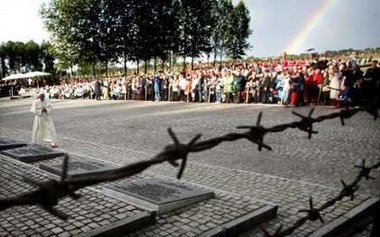Silence at Auschwitz

The Holy Father, self-styled as a "son of the German people", personally insisted on a visit to Auschwitz-Birkenau today and to walk around the camp (above), to meditate in that place of tremendous suffering and to pray and lay a candle at the memorial and to meet with survivors of the Nazi concentration camp.
The BBC video clip (which is available via this link to the BBC News page) clearly shows what a moving event this was and indeed how effectively it preached "God is Love". Some also have commented on the rainbow, God's sign of hope and promise, which appeared over the camp during the Pope's visit (below).
In the face of great suffering and evil at Auschwitz, the Holy Father pondered: "In a place like this, words fail. In the end, there can only be a dread silence, a silence which is a heartfelt cry to God - Why, Lord, did you remain silent? How could you tolerate all this?"
Silence.
Sometimes that is the only answer we can have when we encounter the mysterium iniquitatis.
The following reflection from the Prologue to the Acts of the General Chapter of the Order of Preachers in Krakow 2004 was also written after a visit to Auschwitz and resonates with the Pope's experience. It is a profound meditation on preaching which moved me to tears the first time I heard it and I am pleased to be able to share extracts from it with you:
"Our visit to Auschwitz presented us with an example of extreme exclusion, which did not end 60 years ago. Our world has always been, a world of conflict but now this is global: a new world [dis]order, massive inequalities, discriminatory and bloody xenophobia, common attacks on the most fundamental rights to life, obscene wealth amid widespread misery, epidemics barely acknowledged and inadequately met. Albert Camus, speaking to the French friars after World War II, reminded them that ‘there is in this world beauty and there are the humiliated. We must strive,’ he said, ‘not to be unfaithful, neither to the one nor to the other.’ There are some people so tormented by the injustices in our world that they forget that the sun rose in the morning; there are others so taken with the beautiful that they are blind to the sufferings of others. These are some of the issues before us, provoking questions for which we have no complete answers. And yet, as an Order of Preachers, we must respond – not merely with words but with the Word that lives in our lives. We must strive not to be unfaithful, neither to beauty nor to the humiliated...
Do we dare risk being drawn beyond the security of what we know, dare to go out and enter the homes of those whom we do not know, to find ourselves bewildered and silenced? For this silence is creative: it is the silence of our nuns; it is the silence of the voiceless that invites us into another world.
To enter this other world is to discover ourselves as one small part of a world where the liberating word comes from elsewhere. It comes from those on the margins of society. It comes from those in our world whose concerns are bigger than themselves, who care for creation and the environment, for prisoners and patients, often putting their own lives at risk. To enter this world is to yield the illusion of power in order to be ‘possessed by others.’ To do so is to learn humility, to be docile before the wisdom and language of others’ experience, where we preachers receive much more than we give.
Like Dominic, we are but beggars, waiting in silence for a word from God and from others.
It is important for us to dare to learn with others how God has communicated himself to them, and from them learn the languages we need for our preaching. This is important if we are to be witnesses of a life that can only be experienced as gift and mystery.
To preach in this world is to share the life, the hope, and the promise that lives in the world of the other. To preach in this world is to walk on the frontier between sharing the lives of all those others and sharing the promise of salvation, bringing the good news of Jesus Christ to them and discovering that he has gone before us into Galilee.
In this world we will have something to say, but only if it is a word for which we have suffered, a word we have fought for, and a word for which we have prayed. And this response – like that of the trumpeter of Krakow, whose hourly call ends abruptly – might be a word that ends in silence as the only adequate response before suffering humanity or before the immensity of the mystery..."








0 Comments:
Post a Comment
<< Home